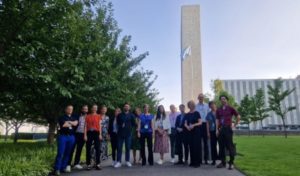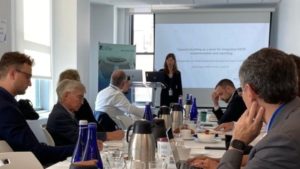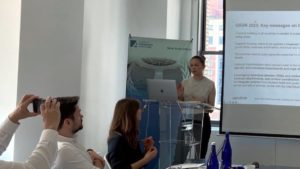As part of the German delegation, the SDSN Germany office took part in various events throughout the duration of the conference and organised its own activities, such as a side event, an online briefing and an expert discussion.

The United Nations (UN) High-Level Political Forum on Sustainable Development (HLPF) is the central UN platform for reviewing the implementation progress of the 2030 Agenda with its 17 Sustainable Development Goals (SDGs). The HLPF took place from 8 to 17 July in 2024 in New York under the title “Reinforcing the 2030 Agenda and eradicating poverty in times of multiple crises: the effective delivery of sustainable, resilient and innovative solutions”. SDGs in focus at the HLPF were SDG 1 (poverty), 2 (hunger), 13 (climate), 16 (peace) and 17 (global partnerships). In addition, 38 countries presented their national SDG implementation in Voluntary National Reviews (VNR).
To kick off the HLPF, SDSN Germany organised a networking dinner for the German delegation, consisting of governmental and non-governmental representatives. In addition, the online briefing “Global Sustainability Diplomacy in Times of Crisis” was organised together with the Global Policy Forum, the German NGO Forum on Environment and Development and the German United Nations Association on 15 July 2024. Participants reported (mostly) live from New York on the status of discussions at the HLPF. SDSN Germany reported in particular on promising SDG acceleration approaches, such as integrated policy approaches that take into account SDG interactions, multi-stakeholder approaches, diverse capacity building measures for transformational change or, for example, the reduction of inequalities. The importance of the HLPF for global joint learning for SDG implementation at national and local level was also emphasised.

The side event organised by SDSN Germany, the Science Platform Sustainability (wpn) 2030 and the Colombian think tank CEPEI on 15 July 2024 focused on capacity building and peer learning for integrated governance of national sustainable development strategies (NSDS), based on the Global Sustainable Development Report (GSDR) 2023. Case studies from Germany, Brazil and Latin America/Caribbean highlighted enabling conditions and barriers for effective SDG governance. Key findings emphasise the need for capacities for interdepartmental coordination, the involvement of social groups and the integration of different policy areas. In Latin America/Caribbean and Colombia, challenges such as lack of political leadership, interdepartmental cooperation and disinformation were highlighted. Transparency, accountability, decentralisation or the provision of disaggregated data are crucial for integrated NSDS implementation and reporting in the region. In Germany, transformation teams helped to strengthen trust between ministries, but limited resources and high coordination efforts remain challenges. Brazil’s VNR process demonstrates the importance of capacity development for civil society and local governments. Peer learning and digital platforms support the scaling of best practices and their transfer to other contexts.

On 12 July 2024, SDSN Germany also hosted an expert discussion on linking the 2030 Agenda and the HLPF with international negotiation processes and forums. The important function of the HLPF as the only international forum for reviewing the implementation of the 2030 Agenda and as a space for exchange and mutual learning was emphasised. Increased synergies between the 2030 Agenda and other multilateral sustainability-oriented processes (e.g. Paris Agreement, Kunming-Montreal Biodiversity Framework, G20) represent great potential, particularly for the remaining period of SDG implementation, but also beyond. To this end, it would be necessary to create common spaces for substantive discussions on the interrelationships, synergies, conflicting goals and overarching solutions for accelerated implementation of the commitments.

Schreibe einen Kommentar